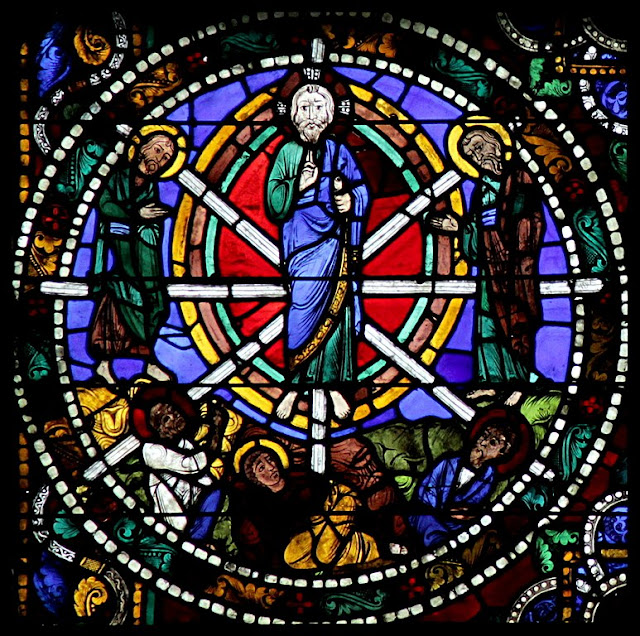Even more than our nation's history, freedom is the hallmark of our Christian religious heritage, and we heard the history of that heritage in our readings today. In the first reading, Joshua leads the Israelite people at long last into the Promised Land. Forty years after God had freed them from slavery in Egypt, after their period of purification and preparation in the desert, they enter at last into the land that God had promised them as their inheritance. And it’s here at last that the manna ceases – the bread that mysteriously appeared every morning, and had fed the people along the way, comes to an end because their journey has come to an end. They are now in their rightful place, their place of rest, their true homeland.
In our second reading, St. Paul explains how this foundational story has been spiritualized, so that all people can be the People of God and receive a heavenly inheritance. It is in Jesus Christ, he says, in the sacrifice of his death on the Cross, that God has restored human beings to himself: he rescued us from the slavery of sin – a slavery even more terrible than what was practiced in Egypt or in the Southern states – and reconciled us to himself. In Christ, humanity has the ability to receive something far greater than it ever lost: access to the true and heavenly homeland, and a new identity as God’s beloved sons and daughters.
This dynamic is true for humanity as a whole, but it is important to understand it not just theoretically but in the way it actually plays out in our lives. A proclamation of emancipation only matters if a person actually experiences freedom as a result. That’s why each of us must recognize that, at a deep level, we are all like the younger son in the Gospel story. By our pride, by our greed, anger, lust, gluttony, selfishness, or whatever else, each of us has squandered our inheritance and gone away from the Lord, like wayward sheep seeking our own way. Unfortunately, like that young man finds out, choosing a path away from the love of our Father doesn’t lead us to success or self-fulfillment, but only to bitter disappointment and loss. However, God does not give up on us. If we can, by his grace, pick ourselves up and turn back to him, we will find that he always welcomes us back with warmth and love. In his house, we find freedom from our slavery, we find newness of identity, because Jesus the Son has made it possible for us to also be God’s beloved sons and daughters.
 |
| The Prodigal Son (2019) by Wayne Pascall |
So, thanks be to God that what the scribes and Pharisees say is true: Jesus welcomes sinners, and communes with them. The Parable of the Prodigal Son is a symbolic explanation of God’s mercy, but that mercy is actually encountered not in a story but in real life. We need to experience it personally, and we do so most fully in the sacrament of penance. We will have an opportunity to participate in this sacrament again this week in our parish’s penance service on Tuesday evening. I encourage us all to come and make use of this great sacrament – if not here, then somewhere, before the end of Lent. Let’s do this even if – especially if – we have been away from the sacrament for a long time. There can be lots of things that might tempt us to stay away: perhaps fear, or shame, perhaps a past bad experience in confession, perhaps a lack of certainty about just where we are at spiritually, of what we need to confess and how we need to change. But don’t let any of those things be an obstacle that prevents you from making your way back to the Father’s house. If you trust that the Lord desires to unburden you and liberate you of your sins, and if listen to the voice of the Holy Spirit urging you to get up and return to the Father’s house, I know you will find the sacrament to be what I myself find it to be: an experience of reconciliation, of being welcomed back by the heavenly Father, who is always loving and merciful.
And if, for some reason or another, it's not possible for you to receive sacramental absolution at this time, don’t lose heart. Consider offering to God just a few words of sorrow for your sins, perhaps through an Act of Contrition, or a prayer of your own making. Tell him how much you regret going astray and how much you desire to be liberated from your sins and renewed in your spiritual life. I bet you’ll find that, much like the younger son in the Gospel, you will hardly begin to speak before the Father interrupts you with his mercy and assures you in some way of his abiding love.
Friends, as we continue our Lenten journey, let’s give thanks to God for the great Emancipation Proclamation he has given us in the love of his Son. We are journeying closer to the solemnities of the Lord’s Passover, the great celebration of his setting us free from sin and death by his Passion, Death, and Resurrection. In these last few weeks, let us set aside our pride and hesitance, and return to the Lord’s loving embrace. And as we prepare for this Eucharist, may we be reminded how it is here in this Sacrament where the Lord restores and renews us, giving us no manna as our food for the journey, but his own Body as our true and living Bread. May its graces enliven us and lead us onward to our rightful place, our place of rest, our true and heavenly homeland.


